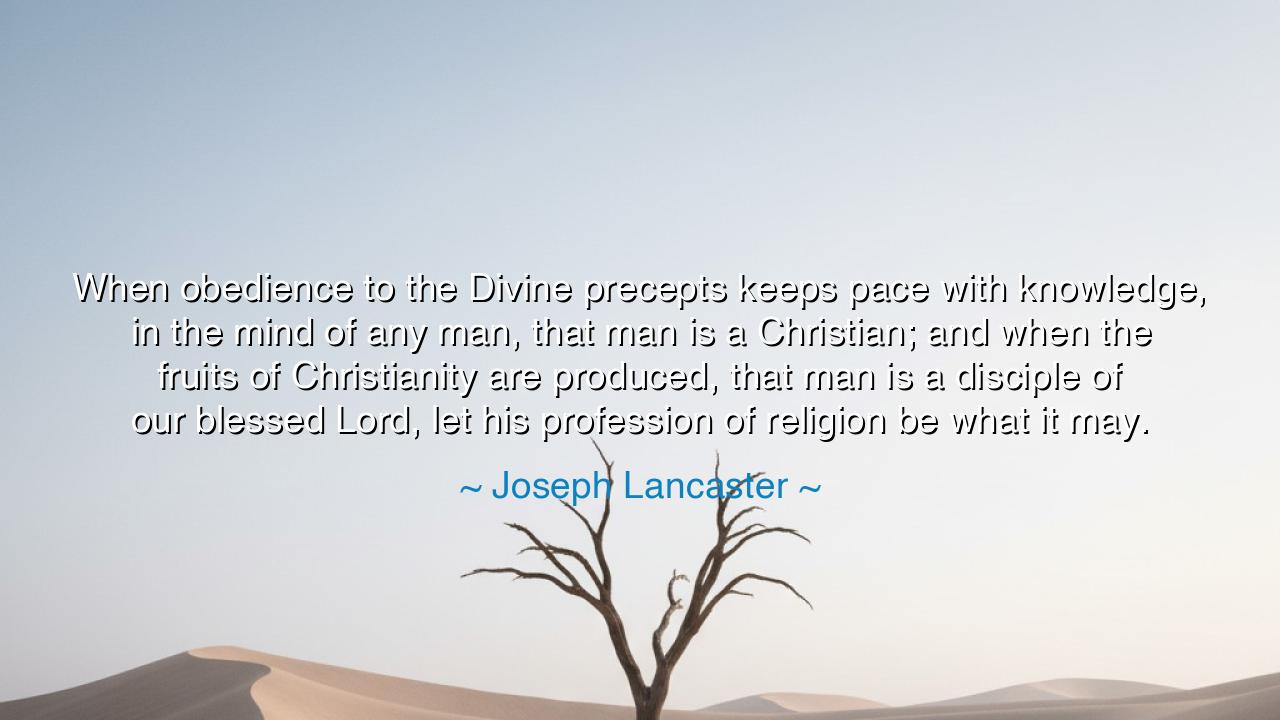
When obedience to the Divine precepts keeps pace with knowledge
When obedience to the Divine precepts keeps pace with knowledge, in the mind of any man, that man is a Christian; and when the fruits of Christianity are produced, that man is a disciple of our blessed Lord, let his profession of religion be what it may.






“When obedience to the Divine precepts keeps pace with knowledge, in the mind of any man, that man is a Christian; and when the fruits of Christianity are produced, that man is a disciple of our blessed Lord, let his profession of religion be what it may.”
Thus spoke Joseph Lancaster, the humble yet visionary reformer of education in the early nineteenth century — a man who saw in every human being, rich or poor, the capacity for divine light. His words are not those of doctrine, but of universal faith, of a wisdom that transcends the boundaries of creed and denomination. In this saying, Lancaster reminds us that true religion lies not in the profession of belief, but in the harmony of knowledge and obedience — in the living of truth rather than the claiming of it.
When he says, “obedience to the Divine precepts keeps pace with knowledge,” he speaks of balance — the sacred alignment between knowing what is right and doing what is right. Knowledge, by itself, can become pride; obedience, without understanding, can become blind ritual. But when the two walk together, as companions upon the same path, the human soul reflects the divine order. To obey the Divine precepts is to live by love, mercy, humility, and justice — not merely to know them as words, but to let them shape one’s being. In Lancaster’s eyes, Christianity was not a name, but a nature; not a label one bore, but a life one lived.
The origin of this thought was born from Lancaster’s own life of struggle and service. A Quaker by faith and a teacher by calling, he devoted himself to educating the poor children of England — those whom society had forgotten. He believed that ignorance was not only a social evil but a spiritual one, for without knowledge, the light of conscience could not fully awaken. Yet he also saw that knowledge alone was insufficient; it must be guided by obedience to divine principles. In his schools, he taught not only letters and numbers but honesty, kindness, and discipline — for he believed that the purpose of education was not merely to sharpen the mind, but to elevate the soul.
In his time, the world was divided by sects and creeds, each claiming the mantle of truth. But Lancaster, in his wisdom, declared that true discipleship cannot be confined by religious labels. “When the fruits of Christianity are produced,” he said — when a man acts with compassion, forgiveness, and humility — then that man is a follower of the Lord’s spirit, whether he calls himself a Christian or not. For Lancaster understood that God’s image is reflected not in the words we recite, but in the fruits we bear. This teaching echoes the words of Christ Himself: “By their fruits ye shall know them.” Thus, Lancaster stands among those rare souls who sought unity where others saw division — who recognized that the essence of faith is love in action.
Consider the life of William Wilberforce, the English reformer who fought tirelessly for the abolition of the slave trade. Though born into privilege, he let obedience to divine justice guide his knowledge and position. He studied the evil of slavery, but he did not stop at knowing; he acted, he spoke, he labored for years against the chains of cruelty. In him, Lancaster’s truth shines clearly: knowledge and obedience walked hand in hand, and through that union, the fruit of Christianity — compassion and freedom — was born. His religion was not mere profession but transformation, not creed but courage. And such, Lancaster would say, is the measure of every true disciple.
This wisdom reaches beyond religion and into the heart of humanity itself. In every walk of life, the union of understanding and righteousness defines greatness. The scholar who learns truth but fails to live it is like a lamp without oil; the devout who obeys without reflection walks in darkness. But the one who learns and then acts, who sees and then serves — that one becomes a light to others. Knowledge becomes holy only when it is obedient to goodness, and obedience becomes noble only when guided by knowledge. Thus, wisdom and virtue together form the two wings of the soul’s ascent toward heaven.
Therefore, O seeker of truth, take this teaching to heart: let your knowledge be humble, and your obedience enlightened. Study deeply, not to boast, but to understand the will of the Divine; act righteously, not from fear, but from love. Do not be deceived by outward professions of faith, whether your own or another’s. Judge by the fruits — by compassion, honesty, forgiveness, and the quiet courage to do good. For as Lancaster teaches, it matters little what name you bear or what creed you claim; what matters is whether your life reflects the light of the One who is good.
And so, the lesson endures: to be a Christian — or rather, to be truly human — is not to wear the title of faith, but to live the truth of it. Wherever knowledge and obedience walk together, there God is present. And wherever the fruits of love and righteousness blossom, there stands a disciple of the Divine, no matter what language he speaks, what nation he serves, or what creed he professes. For the Spirit of the Lord is known not by the sound of words, but by the light of deeds — and that light, once kindled in the heart, can illumine the whole world.






AAdministratorAdministrator
Welcome, honored guests. Please leave a comment, we will respond soon